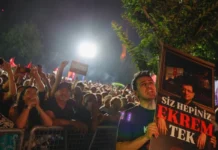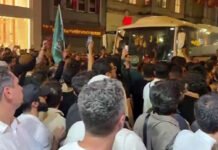A court in Turkey has lifted a two-year travel ban against a German sociologist Sharo Garip, who has been accused of spreading terrorist propaganda. The decision comes a day after German journalist Meşale Tolu was released from custody.
Sociologist Garip was released on Tuesday and granted permission to return to his home city of Cologne in western Germany. The 51-year-old had been barred from leaving Turkey since the beginning of 2016 over terror propaganda charges. Although he’s now free to leave, he will have to return in February, 2018, when his trial is set to continue, according to a report by Deutsche Welle (DW).
“It’s a great feeling to be able to return home,” an elated Garip said after the İstanbul court’s decision, adding that he wanted to leave “as soon as possible.”
The sociologist was arrested after he signed an appeal, along with about 1,200 other academics, urging the Turkish government to end its crackdown on Kurdish communities in Turkey’s southeast.
Garip, who has Kurdish roots, maintains his innocence and has demanded he be acquitted of the charges. “I did not commit a crime,” he said. “I was only exercising my right to freedom of expression.”
The academic has previously compared his enforced stay in Turkey to being trapped in an “open-air prison.” During the two-year travel ban, he was not allowed to practice his profession or travel to conferences.
The decision to release of Turkish-German journalist Tolu and academic Garip came two weeks after German federal prosecutors dropped an investigation against a dozen Turkish imams sent from Turkey who had been suspected of spying in Germany on behalf of the Turkish government.
At least 1,128 Turkish and foreign academics signed a petition which emerged in January 2016 calling for an end to the military’s crackdown on outlawed Kurdish militants in the southeast that had begun six months earlier. The petition, initially signed by 1,128 academics calling themselves Academics for Peace and then by more than 1,000 more, declared “We will not be party to this crime”
The petition condemned the Turkish government’s security operations against the outlawed Kurdistan Workers’ Party’s (PKK) youth movement in cities of southeast Turkey because of the disastrous impact of the operations on the Kurdish civilian population. The petition, made public at an İstanbul news conference on January 11, 2016, also called for a resumption of peace talks with the PKK.
The peace declaration frustrated Turkish autocratic President Recep Tayyip Erdoğan and he strongly criticized the academics in at least five speeches – terming them vile, equal to terrorists, base, and dark – and demanding sanctions against them. Erdoğan and the Justice and Development Party (AKP) government has launched a campaign for retribution against the academics. Some of the insults Erdoğan used against them included “so-called intellectuals,” “a flock called intellectuals,” “traitors” and “rough copies of intellectuals.”
Hundreds of academics who signed the declaration were detained when police raided their homes and offices across Turkey after the declaration was announced on Jan. 11, 2016, while hundreds of them were removed from their jobs.
The trials of academics started on December 5, 2017, and will continue over the following months. At least 146 academics from public and private universities in İstanbul will face individual and separate trial hearings for “spreading terrorist propaganda” on behalf of the PKK. New cases are expected to be opened against signatories of the petition.















